Retired in Rome Journal: Walking with the wolves as an A.S. Roma soccer fan
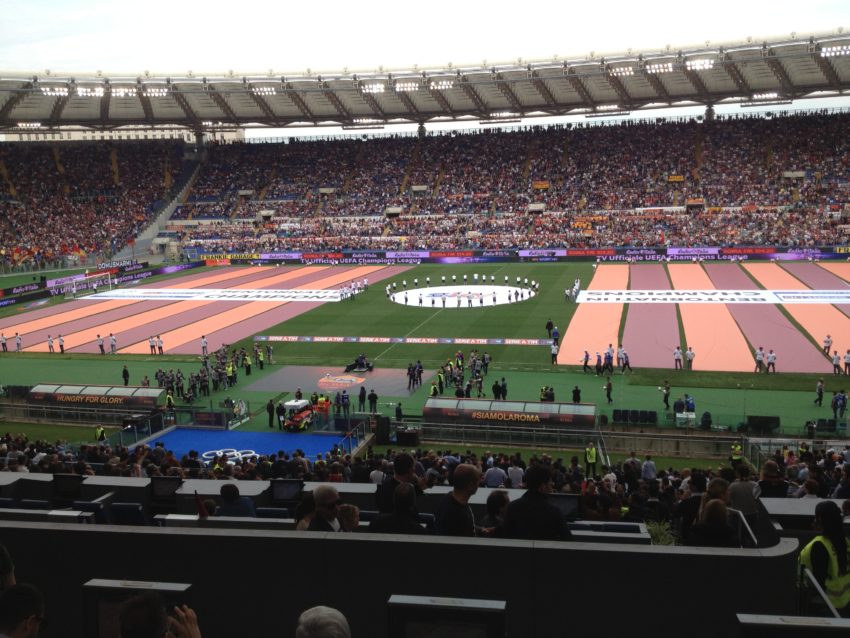
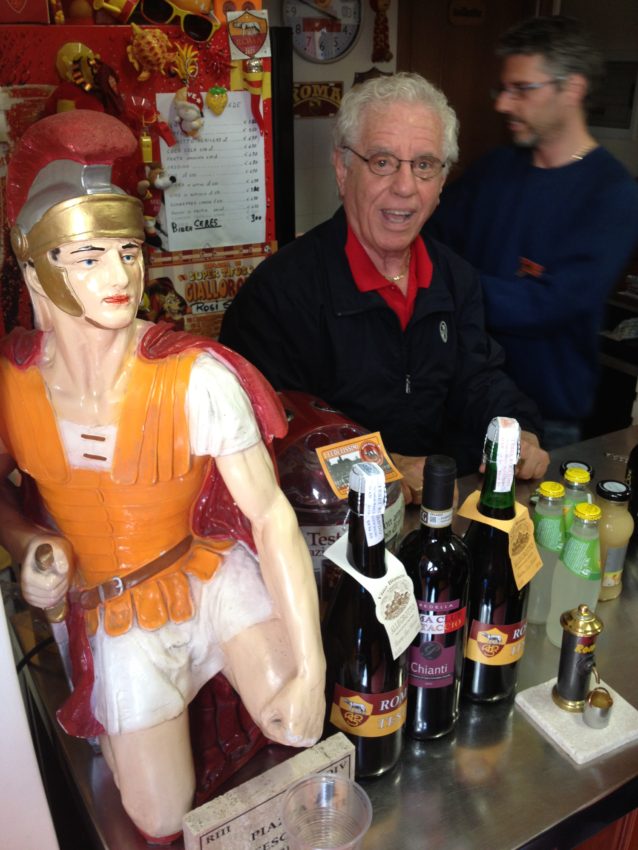

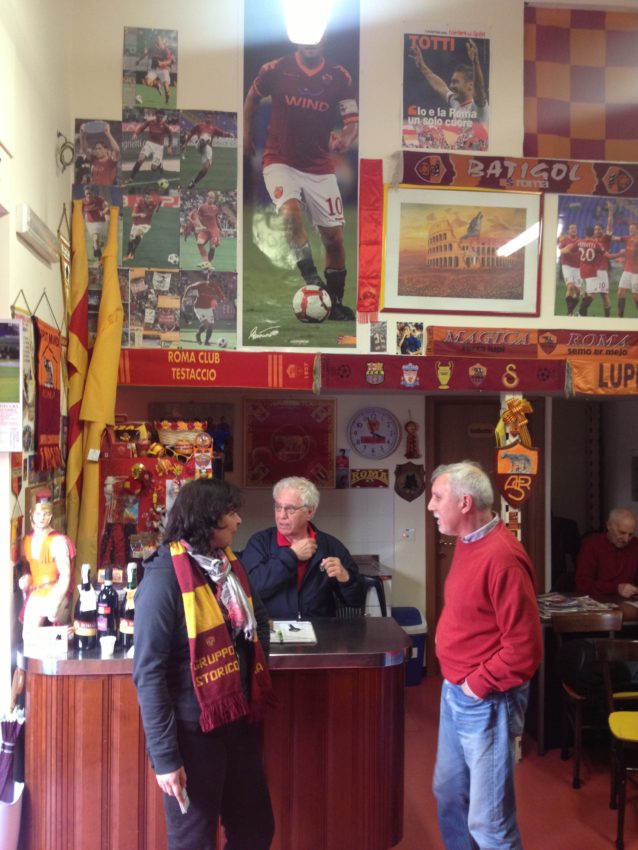
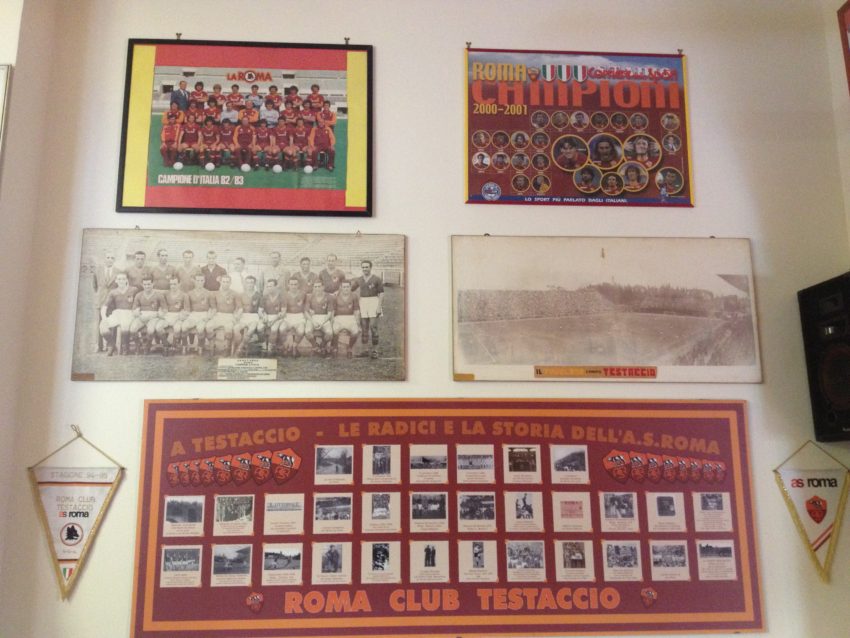
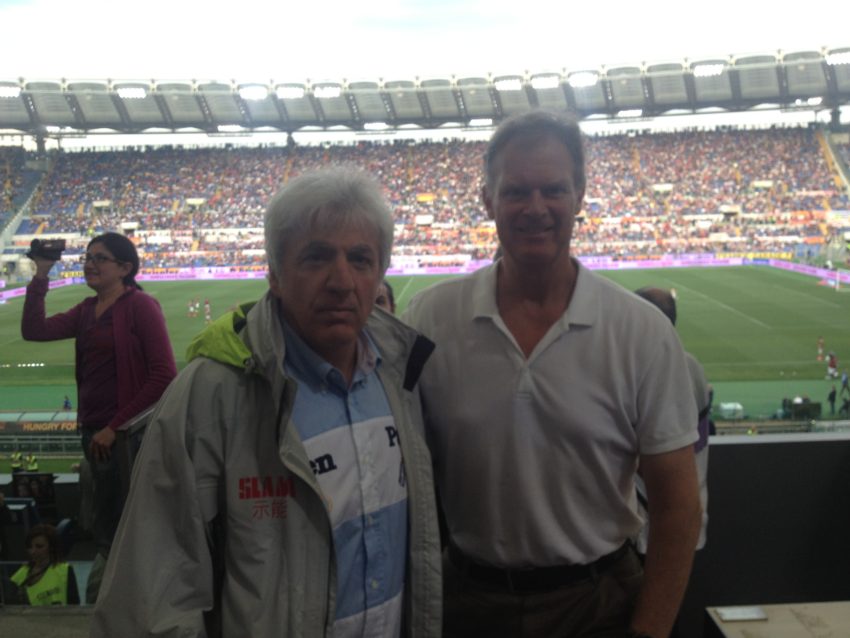
MAY 12
Here’s a little secret insight into what most men have told me is the “greatest job in the world.” Yes, sportswriting is right up there with travel photographer and strip joint masseur. I did it for nearly 40 years and don’t remember a day that was not challenging. I don’t know of another occupation that you can actually call “fun.” Fulfilling? Yes. Interesting? Of course. Fun? Not many. However, what the average fan doesn’t know is this:
Subjectivity’s biggest enemy is journalism.
You can’t be a fan. You don’t want to be a fan. Despite what delusional readers think, deep down they don’t want reporters to be fans, either. Emotion clouds objectivity. It affects the telling of the truth. Writers who are fans either trumpet their team as if they’re already parading down Broadway or the entire coaching staff should be executed.
For 40 years I maintained a neutral stance. I never cared one syllable whether the team I covered won. I rooted for my story. Well, I remember one time I slipped, on purpose. Colorado’s basketball team played Arkansas State in the quarterfinals of the 1991 National Invitation Tournament. If Colorado won, I’d join the team at the semifinals in New York for a week on the company dime. I was a Buff that night. (If I’d known the hot babe I met in Greece the previous summer was going to stand me up and blow a night on Broadway, I wouldn’t have kicked my heels so high when Colorado won.)
This has all changed with my retirement to Rome.
Rome is the only place in the world where I can actually be a horn-blowing, scarf-wearing, obscenity-chanting fan. From my first soccer game at Olympic Stadium during my previous stint here from 2001-03 I have been a fan of A.S. Roma. The 2001-02 season was the year after it won the national league title, known as the Serie A scudetto, for the third time in its history. I arrived to a city still hung over from its celebration six months earlier. Circus Maximus, which once held 250,000 people for chariot races 2,000 years ago, held about that many every night for a week of outdoor parties after A.S. Roma won the title.
I remember my first game. I sat in Curva Nord, one of the Olympic Stadium’s two endzone sections that are packed with crazed fans armed with smoke bombs, obscene songs and team flags the size of the ceiling in the Sistine Chapel. Roma won and the entire section, including me, grasped arms and swayed back and forth to the harmonic, lovely team song, “Grazie, Roma.” I had just arrived in a new city I loved. I made friends all around me. I had found my new city, my new life, my new team. I also found myself welling up.
A big part of the attraction is the logo. It’s Romulus and Remus, the founders of Rome, as tots nursing on the teats of the she-wolf which, according to legend, raised them after they were abandoned. I thought, what other city in the world could be so sexual that part of its team’s logo is a female breast?
From then on, I became what is known as “un lupetto.” It means fan of Roma and comes from the Latin word for wolf, “lupa.” I bought an A.S. Roma jersey, an A.S. Roma scarf, an A.S. Roma bandana, an A.S. Roma banner, an A.S. Roma sweatshirt. My then-girlfriend bought me a gorgeous A.S. Roma bathrobe. My life was colored yellow (giallo) and red (rosso), their team colors which lead to their nickname, “i Giallorossi.”
Returning to Rome after an 11-year absence was like returning to an old girlfriend you never quite forgot. I tried keeping up on Roma in Denver but that’s like following Pac-12 basketball in Kazakhstan. I’d watch Roma when it occasionally appeared on the Fox Soccer Channel and I nearly started a riot at the British Bulldog pub when I walked in before an A.S. Roma-Manchester United match wearing my Roma sweatshirt. The Denver Post carries more news on, well, Kazakhstan than Serie A.
But finding an apartment in the neighborhood of Testaccio increased my romance tenfold. This is where A.S. Roma was founded in 1927. It was in a small, unassuming building not far from this apartment house. Campo Testaccio, where the team played from 1929-40, is six blocks from me. Today it is a weed-covered field only hinting at the rabid crowds that shoehorned into the tiny 20,000-seat facility.
Only four blocks from my apartment is where I found the mother ship. The Roma Testaccio Club, founded in 1969, is where Roma fans go to watch games, drink cheap wine and cheer and curse the team with their neighbors. The club’s walls are lined with grainy photographs from their first seasons and big pictures of fabled old Campo Testaccio. End-of-the-world headlines herald past Serie A titles and grand victories. Team photos showed players with the feathered haircuts of the and too-short shorts from the ‘70s. A small bar sells Testaccio T-shirts and bottles of wine with yellow and red wolves on the labels. I walked around the neighborhood in my A.S. Roma sweatshirt and people walk by, point at my shirt and yell, “FORZA ROMA!” (GO ROME!).
The traditional response I yell back? “SEMPRE!” (ALWAYS!)
For me, living in Testaccio was like a life-long Yankees fan from Italy finding his dream apartment in the Bronx.
Running the Testaccio Club is Sergio, an energetic man in his 60s with a head full of curly gray hair who dispenses wine and soft drinks from behind a counter displaying a large model of a Roman soldier wearing red and yellow. It’s the place to be in Rome if you’re not at the stadium. For 7 euros you get a big-screen TV that covers the entire far wall, a seat and drink. Being the lone foreigner (my reserved seat had a sign reading “U.S.” as if I was at the UN General Assembly) he always gave me a refill.
I picked a fantastic season to return to fandom. The new owner, a Boston venture capitalist named James Pallotta, financed a team that went out last off season and signed a lightning-fast striker from the Ivory Coast named Gervinho, attracted a solid defender in Moroccan Mehdi Benatia and improved its goalkeeping by luring Morgan DeSanctis from Napoli. The big addition was signing coach Rudy Garcia, a little-known Frenchman who led Lille to second place in France’s Ligue 1 last year. Roma opened with a Serie A-record 10 straight wins to start a season. Using a more attacking style, a vastly improved defense and the stalwart leadership of Francesco Totti, the John Elway of Rome, they’ve won 26 games. They’ve tied seven and lost only four for a team-record 85 points going into Sunday’s season finale at Genoa. If not for Juventus, which won its third straight scudetto with a record 99 points, I’d be writing this still hammered from the weekend before.
Watching soccer in Rome is unlike anywhere in the U.S. They don’t have concessionaires selling snacks in the Olympic Stadium. No one eats. No one drinks. They’re too busy watching the game. Once at the Testaccio Club, right after the opening kickoff, I said something briefly to the man next to me. The woman in front turned around and hushed me up as if I was in a cathedral. Then again, I sort of was. When Roma scores I jump up and hug total strangers, an action as foreign to me in my 40-year career as streaking. At 58 years old, I’d finally let my hair down like the 76,000 who fill Sports Authority Field at Mile High and the 50,000 who once filled Coors Field. I started realizing what makes fans pay $25 for parking and wear a 23-year-old kid’s football jersey to work. I finally found the target whom I’d been writing to all those years.
This time, it was me.
With the season winding down and Juventus already clinched the title, I went to Roma’s home finale Sunday. It was against Juventus. Despite it meaning nothing in the standings, the grudge match packed the stadium. Juventus fans filled one section with black and white as police wearing bright-lime vests guarded them behind cyclone fences as if they were caged rats in a room full of hungry lions. Before the game, Roma unfurled a gigantic banner on the field reading, “Bentornati in Champions” (Welcome back to the Champions League), a nod to its second-place finish putting it into next season’s European club championship.
With the final standings set, the anticlimax of the game wasn’t helped by both coaches playing backup goalkeepers. Roma airmailed a few shots over the goal and Juventus looked satisfied watching Roma just pass the ball around. It wasn’t a great advertisement for the best two teams in Italy. Things picked up in the second half with “Juve” goalkeeper Marco Storari making two diving stops of ricochet shots and another bouncing off the goalpost. It appeared the home season would end in an uninspiring 0-0 draw. Then, late in extra time, a Juventus pass somehow, incredibly, rolled untouched through the middle of the 18-meter box. Pablo Osvaldo, a Roma player last season, was there waiting and he fired a howitzer into the upper-right hand corner of the net. The goalkeeper could barely move. Juventus’ bench emptied. Olympic Stadium went silent. A moment after the ensuing kickoff, the horn sounded. Juventus had won with a goal in the last five seconds of the game.
The scene after the game was nice. All the Roma players grabbed their kids and walked around the stadium, stopping at each section to clap to the fans who applauded wildly despite the loss. Totti, 37, a Roma player since he was 17 and the second-leading scorer in Serie A history, stood by himself on the sideline looking at the scene. It won’t be for the last time. He wants to play two more seasons until he’s 40. Roma’s future looks good. Word got out Sunday that they had signed Miralem Pjanic, their cat-quick midfielder from Bosnia, for two more years. Pallotta, who still must sign Garcia to an extension, is working on a state-of-the-art, 60,000-seat, $415 million stadium to open for the 2016-17 season.
I went out afterward for a pizza with Alessandro, my sportswriter from ANSA, Italy’s wire service. I asked what he wrote. He said he ripped Roma’s fans. “Every chant they made was against Juve or against Napoli,” he said. “They never ONCE yelled anything for Roma. Not one FORZA ROMA!”
He’s right. Roma hates Napoli. It’s a rivalry that goes back ages. Naples has it tough in many places in Italy due to its long-time tradition of multi-culturalism. Racist banners have been common at Napoli away games. Sunday night, Roma fans went back nearly 2,000 years to heckle. “VESUVIO LAVA LI CON IL FUOCO!” (VESUVIUS WASHES YOU WITH FIRE!) Then there was the requisite, “JUVE! JUVE! VAFFANCULO! JUVE! JUVE! VAFFANCULO!” (JUVE! JUVE! GO FUCK YOURSELF! JUVE! JUVE! GO FUCK YOURSELF!)
Roma fans are developing a rotten reputation and one that nearly kept me from moving here. Last spring, Roma played at A.C. Milan which boasts national star Mario Balotelli. He was born in Sicily to Ghanian parents and given up to Jewish-Italian foster parents when he was 3. He was raised in the small town of Concesio near Milan. He’s black as any West African team player but as Italian as ossobuco. In that game last spring, every time Balotelli touched the ball, visiting Roma fans made monkey sounds. I was stunned. I was speechless. Lazio, Rome’s other team, has a long-time history of fascism. Its Laziali made similar gestures to Emerson, Roma’s Brazilian star, when I lived here 11 years ago. They even threw bananas on the field. Can you imagine a fan doing that to LeBron James? James wouldn’t even be able to get at the guy. The white fans would beat the crap out of him — and the U.S. is one of the most racists countries in the world.
In Milan that day, Balotelli walked off the field and I nearly walked off my path toward Rome.
I took action. I sent a scathing email to a British political commentator in Rome, James Walston, who published it on his website. I talked to my Italian instructor in Littleton who brushed it off, saying, “E’ solo calcio.” (It’s only soccer.) Alessandro said the chant was more based on their general hatred for Balotelli, an amazingly gifted soccer star with a penchant for pouting and emotional drama. Other Roma fans I knew, however, talked me off the ledge. They said that element is limited to a small portion of the Curva Sud, the vicious end of Olympic Stadium. I had never heard my fellow luppetti utter a racist word. In all my time living in Rome, which is now 20 months, I’ve never heard a racist comment.
So I continued my path to Rome and I am now entrenched in a soccer culture that is more ingrained in the masses than the massive religious machine upriver that is the Vatican. I wear a new bright yellow A.S. Roma bathrobe out on my terrace, sipping my cappuccino and looking out over the neighborhood that gave birth to my team. And while Pharrell Williams’ “I’m Happy” is producing videos in Papua New Guinea, another song plays on a continual loop in my head.
“Tell me what it is that makes us feel friends even though we do not know
Tell me what it is that makes us feel united even though we are far away.
Tell me what is it beating strong strong strong at heart, that takes away the breath and speaks to us of love.
Grazie Roma that we do still cry embraced.”


May 13, 2014 @ 8:26 am
Great job John. It’s so hard to describe the passion that soccer invokes, the passion that determines your wardrobe or makes a guy like me travel to England to see my fourth-division team play at home. The atmosphere in the stadia is incredible. The SEC fans may think they’re passionate but I’ve yet to see them singing songs during games about what their teams mean to them, or to let the players know they’ll never walk along. So happy you’re in that environment and living your dream.
March 19, 2020 @ 7:30 pm
Hi john, my wife and I were at that Roma – juventus game ! Saw the entire match and yes Osvaldo scored in extra time. But I missed seeing the gol. I went to rest room seconds before the end ! Lol can you believe it. No one gets up for food or leaves their seat, But Me. Lol.